#learn Chinese
Explore tagged Tumblr posts
Text
language learning is such a personal thing that there is no “right” or “wrong” way of doing it. it’s whatever works on bringing YOU closer to YOUR goal.
you want to watch tv shows but don’t really care for speaking with others? yay!! no speaking practice needed.
you want to learn quickly for an upcoming trip? yay! text book phrases and simple grammar.
you’re a beginner and it’s been 10 years? 2 weeks? 6 months? it doesn’t matter. as long as you are working towards bringing YOURSELF closer to what YOU want to achieve, you have succeeded: you are succeeding; you are doing great.
i find that so much demotivation comes from comparison and/or trying to follow other's advice too closely. if anki decks don't work for you, that's fine! if duolingo works well for you, then use it!
this language learning thing, it should be enjoyed. in the sea full of deceptive polyglot stories and videos on top of videos attempting to understand how to learn languages in "the fastest way possible" sometimes we should sit back and ask ourselves, "when is just learning things, enough"?
with that i hope you all continue working towards your dreams! whether you want to become a translator or just watch a few more movies in your target language, you can do it. i know you have it in you.
#langblr#studyspo#language#languages#language learning#learn chinese#learn french#learn german#learn korean#polyglot
1K notes
·
View notes
Text
my Mandarin teacher has been giving us tongue twisters recently to help our pronunciation so I thought I'd share them:
first the classic:
四是四,十是十, 十四是十四, 四十是四十, 他们不是四十四 (sì shì sì , shí shì shí, shí sì shì shí sì, sì shí shì sì shí, tā men bùshì sì shí sì) four is four, ten is ten, fourteen is fourteen, forty is forty, they are not forty-four
and then these two specifically focused on nasal finals:
青青山上一根藤, 青藤底下挂铜铃, 风吹藤动铜铃动, 风停藤停铜铃停 (qīngqīng shān shàng yì gēn téng, qīng téng dǐ xià guà tóng líng, fēng chuī téng dòng tóng líng dòng, fēng tíng téng tíng tóng líng tíng) On a green mountain there is a vine, Under the green vine hang copper bells. The wind blows, the vine moves, the copper bells move. The wind stops, the vine stops, the copper bells stop.
扁担长,板凳宽, 扁担要绑在板凳上, 板凳不让扁担绑在板凳上, 扁担偏要绑在板凳上。 (biǎn dan cháng, bǎn dèng kuān, biǎn dan yào bǎng zài bǎn dèng shàng, bǎn dèng bú ràng biǎn dan bǎng zài bǎn dèng shàng, biǎn dan piān yào bǎng zài bǎn dèng shàng) The bamboo pole is long, and the wooden bench is wide, The bamboo pole wants to be tied to the wooden bench, The wooden bench doesn't let the bamboo pole be tied to it, But the bamboo pole insists on being tied to the wooden bench
#i'll update as she gives us more#mandarin#tongue twisters#learn mandarin#chinese#learn chinese#langblr#chinese langblr
512 notes
·
View notes
Text
The 然's
突然,虽然,忽然. and the other 然's can often get mixed up, so here's a quick explanation of some of the most common ones!
突然 (Túrán): This means suddenly or unexpectedly
居然 (Jūrán): This kind of means suddenly, but more in the sense of "surprisingly" or to suggest disbelief at something that happened.
忽然 (Hūrán): This also means suddenly or unexpectedly, but it has a more stronger connotation.
既然 (Jìrán): This is a conjunction meaning "since" or "now that"
既然the weather is great, let's go out!
既然 you aren't busy, let's go watch a movie.
不然 (Bùrán): This means "otherwise" or "or else";
You should study, 不然 you won't do well on the exam.
虽然 (Suīrán): This means although or even though.
虽然 I'm not good at singing, I still like to go to the karaoke.
当然 (Dāngrán): 当然 means certainly or definitely and can be used as a reply:
Can you help me with A? 当然!
自然 (Zìrán): This can mean nature or naturally.
China's 自然 is very beautiful.
She speaks Chinese 得很自然.
仍然 (Réngrán): This can mean "still" or "yet".
I仍然 haven't read that book.
依然 (Yīrán): Similar to 仍然, this also means still" or "yet" but it's usually used in more formal and literary works, whereas 仍然 is more often used in spoken language.
果然 (Guǒrán): 果然 can be used to mean "indeed" or "as expected"
This movie is 果然 interesting.
竟然 (Jìngrán): This is an adverb used to suggest surprise or something unexpected.
He竟然forgot her birthday.
显然 (Xiǎnrán): This means "clearly" or "obviously".
This soup 显然 hot.
偶然 (Ǒurán): This means "accidentally" or "by chance".
We 偶然 met at the same cafe.
How many other 然's do you know about? Drop a comment!
#slavic roots western mind#student life#student#study blog#college#college life#travel blog#aesthetic#studyblr#study motivation#chinese#china#study in china#life in china#learn chinese#chinese grammar#grammar#vocabulary#chinese vocabulary#chinese verbs#verbs#verb#chinese studyblr#mandarin langblr#mandarin#mandarin chinese#chinese language#language learning#chinese langblr#language resources
293 notes
·
View notes
Text
50+ fundamental crime, suspense, & mystery Cdrama vocab words

I'm currently watching 《模仿犯》, so I was inspired to put together this list of essential vocab for 犯罪剧/悬疑剧/推理剧. I tend to gravitate towards dramas that fall into these genres.
I've sorted the words into categories. These were determined by vibes only. Definitions are adapted from MDBG, my loyal companion for nearly 10 years.
The Case
案子 ànzi - case / law case / legal case / judicial case
案件 ànjiàn - case / instance
办案 bàn'àn - to handle a case
破案 pò'àn - to solve a case
报案 bào'àn - to report a case to the authorities
命案 mìng'àn - homicide case / murder case
作案 zuò'àn - to commit a crime
现场 xiànchǎng - the scene (of a crime, accident etc) / (on) the spot / (at) the site
证据 zhèngjù - evidence / proof / testimony
真相 zhēnxiàng - the truth about sth / the actual facts
The Investigation
厘清 líqīng - to clarify (the facts) / clarification
线索 xiànsuǒ - trail / clues / thread (of a story)
细节 xìjié - details / particulars
痕迹 hénjì - vestige / mark / trace
追踪 zhuīzōng - to follow a trail / to trace / to pursue
追问 zhuīwèn - to question closely / to investigate in detail / to examine minutely / to get to the heart of the matter
排除 páichú - to eliminate / to remove / to exclude / to rule out
嫌疑 xiányí - suspicion / to have suspicions
怀疑 huáiyí - to doubt (sth) / to be skeptical of / to have one's doubts / to harbor suspicions / to suspect that
跟踪 gēnzōng - to follow sb's tracks / to tail / to shadow / tracking
不对劲 búduìjìn - fishy / wrong / not right
隐瞒 yǐnmán - to conceal / to hide (a taboo subject) / to cover up the truth
The Victim
被害者 bèihàizhě - victim (of a wounding or murder)
受害者 shòuhàizhě - casualty / victim / those injured and wounded
幸存者 xìngcúnzhě - survivor
失踪 shīzōng - to be missing / to disappear / unaccounted for
消失 xiāoshī - to disappear / to fade away
绑架 bǎngjià - to kidnap / to abduct / to hijack / a kidnapping abduction / staking
遗体 yítǐ - remains (of a dead person)
尸体 shītǐ - dead body / corpse / carcass
拯救 zhěngjiù - to save / to rescue
寻人启事 xúnrénqǐshì - missing persons notice
The Perpetrator
嫌疑犯 xiányífàn - a suspect
嫌疑人 xiányírén - a suspect
歹徒 dǎitú - evildoer / malefactor / gangster / hoodlum
凶手 xiōngshǒu - murderer / assassin
一伙儿的 yìhuǒrde - in on it together
开枪 kāiqiāng - to open fire / to shoot a gun
鬼鬼祟祟 guǐguǐsuìsuì - sneaky / secretive / furtive
可疑 kěyí - suspicious / dubious
认罪 rènzuì - to admit guilt / to plead guilty
自首 zìshǒu - to give oneself up / to surrender (to the authorities)
下落 xiàluò - whereabouts / to drop / to fall
动机 dòngjī - motive / motivation
犯罪 fànzuì - to commit a crime / crime / offense
The Police
报警 bàojǐng - to sound an alarm / to report sth to the police
警察 jǐngchá - police / police officer
警方 jǐngfāng - police
警官 jǐngguān - constable / police officer
刑警 xíngjǐng - criminal police (abbr. for 刑事警察)
被捕 bèibǔ - to be arrested / under arrest
包围 bāowéi - to surround / to encircle / to hem in
监控 jiānkòng - to monitor
检查 jiǎnchá - inspection / to examine / to inspect
调查 diàochá - investigation / inquiry / to investigate
排查 páichá - to inspect / to investigate one by one
质问 zhìwèn - to question / to ask questions / to inquire / to bring to account / to interrogate
前科 qiánkē - criminal record / previous convictions
Bonus: Here's a list of dramas I have seen/am watching in these categories:
《想见你》 Someday or One Day
《开端》 Reset
《消失的孩子》 The Disappearing Child
《她和她的她》 Shards of Her
《镇魂》 Guardian
《模仿犯》 Copycat Killer
《不良执念清除师》 Oh No! Here Comes Trouble
Now go forth and enjoy some more dramas! I'm a slow watcher, so I add new shows to my watch list faster than I can finish them.
#vocab list#cdrama#cdramas#chinese drama#taiwanese drama#chinese#mandarin#mandarin chinese#chinese language#studyblr#langblr#language study#language learning#chinese studyblr#chinese langblr#mandarin studyblr#mandarin langblr#study chinese#study mandarin#learn chinese#learn mandarin#studying chinese#learning chinese#studying mandarin#learning mandarin#languages#language blog#languageblr#chinese vocab#mandarin vocab
667 notes
·
View notes
Text
Every wanted to tell someone to step on a lego in Mandarin? Here's how:
我希望你踩在乐高上。「我希望你踩在樂高上。」
(I've also seen 踩到樂高)
A favorite variation is 我希望你在漆黑的夜里一脚踩上乐高,光脚!「我希望你在漆黑的夜裡一腳踩上樂高,光腳!」
#langblr#mandarin langblr#chinese langblr#learn mandarin#learn chinese#mine#i am here to teach you useful phrases
90 notes
·
View notes
Text

I keep saying I'll post my study sessions when I have something aesthetic to post. at this rate, I never will post. here's to not-quite aesthetic study sessions and imperfect posts
20 notes
·
View notes
Text
New World Swin S Mandarin Vocab
*.·:·.☽✧ ✦ ✧☾.·:·.**.·:·.☽✧ ✦ ✧☾.·:·.*
即将来临 jí jiāng lái lín - imminent
幻想 huàn xiǎng - delusion; fantasy (HSK5)
奔 bēn - to hurry; to rush; to run quickly (HSK6)
拼命 pīn mìng - to do one's utmost, with all one's might, at all costs, (to work or fight) as if one's life depends on it (HSK6)
频道 pín dào - frequency, channel (HSK5)
迫不及待 pò bù jí dài- impatient, in a hurry, itching to get on with it
冲破 chōng pò - breakthrough; to overcome an obstacle quickly (HSK5)
犹豫 yóu yù - to hesitate (HSK5)
迷茫 mí máng - perplexed, bewildered
呼唤 hū huàn - to call out, to shout (HSK6)
暂停 zàn tíng - to suspend, pause
浮 fú - to float (HSK6)
倾听 qīng tīng - to listen attentively (HSK6)
期盼 qī pàn - to anticipate, to look forward to, to await expectantly
乘 chéng - to ride, to mount (HSK6)
划过 huá guò - (of a meteor etc) to streak across (the sky)
*.·:·.☽✧ ✦ ✧☾.·:·.**.·:·.☽✧ ✦ ✧☾.·:·.*
Lyric Translation Post
#mandarin#langblr#studyblr#mandarin langblr#mandarin vocab#mandarin studyblr#chinese langblr#chinese studyblr#chinese vocab#learn chinese#chinese
41 notes
·
View notes
Text

GUYS THIS HAS BEEN THE BEST WEEK OF MY LIFE I SWEAR. I THOUGHT THEY WOULDNT LET ME KNOW FOR A WHIIILE OMGOMG IM GOING TO TAIWAN
#studyblr#study blog#langblr#langblog#language learning#languageblr#chinese langblr#mandarin langblr#study abroad#taiwan#chinese language#mandarin chinese#mandarin studyblr#studyblr community#chinese studyblr#learning chinese#learn chinese#mandarin study#learn mandarin#studyabroad#exchange student#student life#uniblr#university#college
113 notes
·
View notes
Text
Vocabulary List #58
夕 [xī] - evening
名 [míng] - name
千 [qiān] - a thousand
舌 [shé] - tongue
不 [bù] - no; not
的 [de] - belonging to
大 [dà] - big
又 [yòu] - again
粥 [zhōu] - congee
茶 [chá] - tea
橙子 [chéngzi] - orange (the fruit)
子 [zi] - child; noun suffix
了 [le] - completed action marker
错了 [cuòle] - wrong
对了 [duìle] - correct; oh, by the way...
土 [tŭ] - earth; dust
#langblr#language#languages#chinese#chinese langblr#learn chinese#learning chinese#vocabulary list#vocab list#chinese vocab list#memrise
56 notes
·
View notes
Note
Hi! I'm unsure if you do ask for the incorrect verse for the Wukong or not, and if not just disregard this! But I was wondering if you'd do something along the lines of s/o learning Chinese, and they go to say something to them and somehow mess it up xD I apologize if you're not taking quests though, I'm blind for not seeing it 😅
WHAT?!?! I've been telling people that my inbox has been open for months. Thank god you were actually listening I will be more than happy to answer your request Please keep them coming😳😳😳😳🥳🥳🥳🥳
Ok so (Y/N) has been teaching herself Chinese for months from online Classes to books she got from the library. You wanted to surprise your husbands by saying I love you in Chinese I'm sure you can imagine how that worked out😏 but unfortunately when the day came you chocked infront of him and now the surprise is ruined.

(Lmk Wukong): He was shocked to find you were learning Chinese behind his back, and you were trying to say something Meaningful. He's Shookth, but he will start laughing a bit when you messed up on the pronunciation. Don't pay any mind to that part He's more in love with you then ever.

(Nezha Reborn Wukong) Ok he Cringes a bit when you mess up but he's smart enough to know what your Trying to say and therefore he responds back to you in Chinese as well so don't feel to bad He'll teach and help you practice, He also loves you more than ever.

(Mk Reborn Wukong) He's like what the hell is the point of this when you try to say you love him in his language. when he finds that you think you would connect with him better if You literally spoke his language then I guess he'll appreciate it,But just because you Messed up doesn't mean he hates it he'll just lowkey help you practice but Don't tell anyone Also be ready to argue with him in Chinese too🤦♀️.

(Hero is back wukong) He Calmly correct you on the pronunciation of what you're saying. Then he tells you that he loves you back. He finds it intriguing that you seem to want to learn And communicate with him and that might make him feel special. So congrats he loves the surprise🥰🥰🥰.

(Netflix Wukong) he's totally gonna laugh. Just imagine somebody trying to talk to you in your butchered native Language it's gonna be a bit funny but also mildly offensive but he's not gonna think so. It's sweet how you want to talk to him In his language and there's just something special about that. So he loves how you want to communicate with him in his language And it might be useful if he wants to gossip about the people around him with you.
So rather they wanna admitted or not they love the idea and also love you🥰🥰🥰
Feel Free to Reblog 😇👍
#monkey king netflix#monkey king reborn#monkey king x reader#x female y/n#lmk monkey king#nezha reborn#monkey king hero is back#learn chinese#couple goals#It's working we're learning
47 notes
·
View notes
Text
one thing about learning languages is that yes, learning in itself is fun but what’s even greater is the fact that all your other interests and hobbies can be looked at with another shade of light. I personally love philosophy and to be able to read another language’s nuances and concepts and understand it more than you ever could with a translation? incredible.
#language learning#languages#langblr#learn chinese#learn french#learn german#learn korean#learn spanish#study korean#language#polyglot#philosophy
699 notes
·
View notes
Text
Speak DECENT CHINESE in 4 months - 8 easy tips
______
1. Have someone to guide you to get good pronunciation habits. It is almost impossible to re-learn bad habits later so make sure you get your pronunciation right from the beginning. I mean the pronunciation of the sounds, not the tones. Tones take more time to get used to and you can't rush it - but try the best you can. Some tutors don't bother too much about the pronunciation so make sure you find someone who is strict about that, you will be grateful later. Also get confident in pinyin, you will need it.
2. Understand the composition of the sentences. The word order is super easy and it stays the same all the time (the question and informative sentences have the same word order). I have a formula for the word order but I won't reveal it here, it is one of the secrets I keep for my students and people who use my materials.
3. Understand that there are no tenses in the sense we think about them in English and other languages. Learn to express future, potential future, finished action, change of state, experience in the past and circumstances of the event. See the difference between action verbs and verbs of state.
4. Learn to use modal verbs and conjuctions.
5. Build usable vocabulary based on the fact that everything in Chinese is interconnected.
6. Understand 就, 才,的 and 得
7. Don't learn grammar rules and words separately. Learn functional practical sentences that will serve you as examples of the grammar structures (then you just need to change the words in these sentences).
8. Develop your listening skills - that is very important. For that there are Youtube channels and podcasts on Spotify (and in my materials the audio part also plays an important role). You can listen to Chinese radio stations just to get the feeling of the language.
______
After 3-4 months you should feel pretty confident in normal conversations if you study regularly under competent guidance.
______
R-evolutionary learning materials and resources: https://chineseffect.com
MAGIC PLAYBOOK for beginners
#learn chinese#learn mandarin#chinese langblr#mandarin langblr#edublr#mandarin#chinese#mandarin edublr#langblr#chinese vocabulary#mandarin chinese#chinese edublr#learning mandarin#learning chinese#study chinese#mandarin vocabulary#study mandarin#汉语#chinese studyblr#beginners chinese#chinese for beginners#learning tips#chinese tips#mandarin tips
301 notes
·
View notes
Text
T - Verbs in Chinese
Tackle (an issue) - 处理 (chǔlǐ)
Take - 拿 (ná)
Talk - 说 (shuō)
Target - 瞄准 (miáozhǔn)
Teach - 教 (jiāo)
Tell - 告诉 (gàosù)
Terminate - 终止 (zhōngzhǐ)
Testify - 作证 (zuòzhèng)
Thank - 感谢 (gǎnxiè)
Think - 想 (xiǎng)
Threaten - 威胁 (wēixié)
Throw - 扔 (rēng)
Tie - 系 (jì)
Tighten - 紧 (jǐn)
Tolerate - 容忍 (róngrěn)
Touch - 触摸 (chùmō)
Train - 训练 (xùnliàn)
Transfer - 转移 (zhuǎnyí)
Transform - 转变 (zhuǎnbiàn)
Translate - 翻译 (fānyì)
Transmit - 传送 (chuánsòng)
Travel - 旅行 (lǚxíng)
Tremble - 颤抖 (chàndǒu)
Trigger - 触发 (chùfā)
Trust - 信任 (xìnrèn)
Try - 尝试 (chángshì)
Type - 打字 (dǎzì)
#中文#chinese#汉语#learn chinese#mandarin langblr#mandarin#learn mandarin#china#studyblr#college life#student#study blog#travel blog#college#student life#slavic roots western mind#study in china#chinese characters#chinese language#汉字#study motivation#chinese langblr#aesthetic#chinese verbs#verb#verbs#vocabulary#vocab#language#linguistics
77 notes
·
View notes
Text
75 essential single-character verbs (单字动词)

When I started consuming more native Chinese content, I quickly discovered an area in which my knowledge was lacking: single-character verbs. In my experience, it’s very easy to focus on learning words consisting of two or more characters and overlook single-character words.
Driven by curiosity, I went through my Anki deck (and also wracked my brain) to generate a list of characters/words that I have learned over the past couple years (roughly). Then I selected 75 verbs that are fairly common and important to know. They skew towards intermediate and advanced vocabulary.
Definitions are from MDBG. For characters with additional meanings that I am not yet familiar with, I have bolded the meanings I want to share.
(1) 抢 qiǎng - to fight over / to rush / to scramble / to grab / to rob / to snatch
(2) 救 jiù - to save / to assist / to rescue
(3) 扶 fú - to support with the hand / to help sb up / to support oneself by holding onto something / to help
(4) 催 cuī - to urge / to press / to prompt / to rush sb / to hasten sth / to expedite
(5) 夹 jiā - to press from either side / to place in between / to sandwich / to carry sth under armpit / wedged between / between / to intersperse / to mix / to mingle / clip / folder / Taiwan pr. [jia2]
(6) 咬 yǎo - to bite / to nip
(7) 砸 zá - to smash / to pound / to fail / to muck up / to bungle
(8) 毁 huǐ - to destroy / to ruin / to defame / to slander
(9) 嚷 rǎng - to shout / to bellow / to make a big deal of sth / to make a fuss about sth
(10) 塞 sāi - to stop up / to squeeze in / to stuff / cork / stopper
(11) 贪 tān - to have a voracious desire for / to covet / greedy / corrupt
(12) 拆 chāi - to tear open / to tear down / to tear apart / to open
(13) 掏 tāo - to fish out (from pocket) / to scoop
(14) 跪 guì - to kneel
(15) 摘 zhāi - to take / to borrow / to pick (flowers, fruit etc) / to pluck / to select / to remove / to take off (glasses, hat etc)
(16) 拎 līn - to lift up / to carry in one's hand / Taiwan pr. [ling1]
(17) 扛 káng - to carry on one's shoulder / (fig.) to take on (a burden, duty etc)
(18) 拽 zhuài - to pull / to tug at (sth)
(19) 愣 lèng - to look distracted / to stare blankly / distracted / blank / (coll.) unexpectedly / rash / rashly
(20) 搂 lǒu - to hug / to embrace / to hold in one's arms
(21) 垮 kuǎ - to collapse (lit. or fig.)
(22) 撑 chēng - to support / to prop up / to push or move with a pole / to maintain / to open or unfurl / to fill to bursting point / brace / stay / support
(23) 甩 shuǎi - to throw / to fling / to swing / to leave behind / to throw off / to dump (sb)
(24) 围 wéi - to encircle / to surround / all around / to wear by wrapping around (scarf, shawl)
(25) 愁 chóu - to worry about
(26) 插 chā - to insert / stick in / pierce / to take part in / to interfere / to interpose
(27) 漏 lòu - to leak / to divulge / to leave out by mistake / waterclock or hourglass (old)
(28) 披 pī - to drape over one's shoulders / to open / to unroll / to split open / to spread out
(29) 歇 xiē - to rest / to take a break / to stop / to halt / (dialect) to sleep / a moment / a short while
(30) 抄 chāo - to make a copy / to plagiarize / to search and seize / to raid / to grab / to go off with / to take a shortcut / to make a turning move / to fold one's arms
(31) 哼 hēng - to groan / to snort / to hum / to croon / humph!
(32) 哄 hǒng - to deceive / to coax / to amuse (a child)
(33) 啃 kěn - to gnaw / to nibble / to bite
(34) 眯 mī - to narrow one's eyes / to squint / (dialect) to take a nap
(35) 趴 pā - to lie on one's stomach / to lean forward, resting one's upper body (on a desktop etc) / (Tw) percent
(36) 揍 zòu - to hit / to beat (sb) / (coll.) to smash (sth)
(37) 蹭 cèng - to rub against / to walk slowly / (coll.) to freeload
(38) 凑 còu - to gather together, pool or collect / to happen by chance / to move close to / to exploit an opportunity
(39) 敲 qiāo - to hit / to strike / to tap / to rap / to knock / to rip sb off / to overcharge
(40) 滑 huá - to slip / to slide / slippery / smooth / sly / slippery / not to be trusted
(41) 碎 suì - to break down / to break into pieces / fragmentary
(42) 盯 dīng - to watch attentively / to fix one's attention on / to stare at / to gaze at
(43) 塌 tā - to collapse / to droop / to settle down
(44) 背 bēi - to be burdened / to carry on the back or shoulder 背 bèi - the back of a body or object / to turn one's back / to hide something from / to learn by heart / to recite from memory / unlucky (slang) / hard of hearing
(45) 数 shǔ - to count / to count as / to regard as / to enumerate (sb's shortcomings)
(46) 按 àn - to press / to push / to leave aside or shelve / to control / to restrain / to keep one's hand on / to check or refer to / according to / in the light of / (of an editor or author) to make a comment
(47) 压 yā - to press / to push down / to keep under (control) / pressure
(48) 亲 qīn - parent / one's own (flesh and blood) / relative / related / marriage / bride / close / intimate / in person / first-hand / in favor of / pro- / to kiss / (Internet slang) dear
(49) 补 bǔ - to repair / to patch / to mend / to make up for / to fill (a vacancy) / to supplement
(50) 舔 tiǎn - to lick / to lap
(51) 拼 pīn - to piece together / to join together / to stake all / adventurous / at the risk of one's life / to spell
(52) 埋 mái - to bury
(53) 抖 dǒu - to tremble / to shake out / to reveal / to make it in the world
(54) 涂 tú - to apply (paint etc) / to smear / to daub / to blot out / to scribble / to scrawl / (literary) mud / street
(55) 抹 mǒ - to smear / to wipe / to erase / classifier for wisps of cloud, light-beams etc
(56) 吞 tūn - to swallow / to take
(57) 拦 lán - to block sb's path / to obstruct / to flag down (a taxi)
(58) 露 lòu - to show / to reveal / to betray / to expose 露 lù - dew / syrup / nectar / outdoors (not under cover) / to show / to reveal / to betray / to expose
(59) 滚 gǔn - to boil / to roll / to take a hike / Get lost!
(60) 扣 kòu - to fasten / to button / button / buckle / knot / to arrest / to confiscate / to deduct (money) / discount / to knock / to smash, spike or dunk (a ball) / to cover (with a bowl etc) / (fig.) to tag a label on sb / (Tw) (loanword) code
(61) 夸 kuā - to boast / to exaggerate / to praise
(62) 挥 huī - to wave / to brandish / to command / to conduct / to scatter / to disperse
(63) 求 qiú - to seek / to look for / to request / to demand / to beseech
(64) 吸 xī - to breathe / to suck in / to absorb / to inhale
(65) 响 xiǎng - echo / sound / noise / to make a sound / to sound / to ring / loud / classifier for noises
(66) 擦 cā - to wipe / to erase / rubbing (brush stroke in painting) / to clean / to polish
(67) 踩 cǎi - to step on / to tread / to stamp / to press a pedal / to pedal (a bike) / (online) to downvote
(68) 撕 sī - to tear
(69) 扫 sǎo - to sweep
(70) 锁 suǒ - to lock / to lock up / a lock (CL:把)
(71) 扎 zhā - to prick / to run or stick (a needle etc) into / mug or jug used for serving beer (loanword from "jar")
(72) 撞 zhuàng - to knock against / to bump into / to run into / to meet by accident
(73) 追 zhuī - to chase / to pursue / to look into / to investigate / to reminisce / to recall / to court (one's beloved) / to binge-watch (a TV drama) / retroactively / posthumously
(74) 抽 chōu - to draw out / to pull out from in between / to remove part of the whole / (of certain plants) to sprout or bud / to whip or thrash
(75) 删 shān - to delete
#vocab list#chinese#mandarin#mandarin chinese#chinese language#studyblr#langblr#language study#learning languages#language learning#chinese studyblr#chinese langblr#mandarin studyblr#mandarin langblr#study chinese#study mandarin#learn chinese#learn mandarin#studying chinese#learning chinese#studying mandarin#learning mandarin#chinese vocab#mandarin vocab#foreign languages#language#languages#language blog#languageblr#language stuff
803 notes
·
View notes
Text
all my mandarin dictionaries (and dictionary-adjacent books)
Through chatting with @don-dake and @cherrymintvampyyri, I've come to realize that I might own a less than normal number of Mandarin dictionaries. So, here's a post about all of them.
I do have two basic bilingual dictionaries (Mandarin/English): the Langenscheidt pocket dictionary and the DK visual dictionary. These are quite easy to buy and not that interesting imo, so I'm not gonna talk further about them.
I'm also going to include a couple books that aren't technically dictionaries, but are rather about etymology of characters, and that's close enough to count for me.
Okay, let's get on to the interesting stuff!
1. What Character is That? An Easy-Access Dictionary of 5,000 Chinese Characters by Ping-gam Go (second edition, 1995)
bilingual
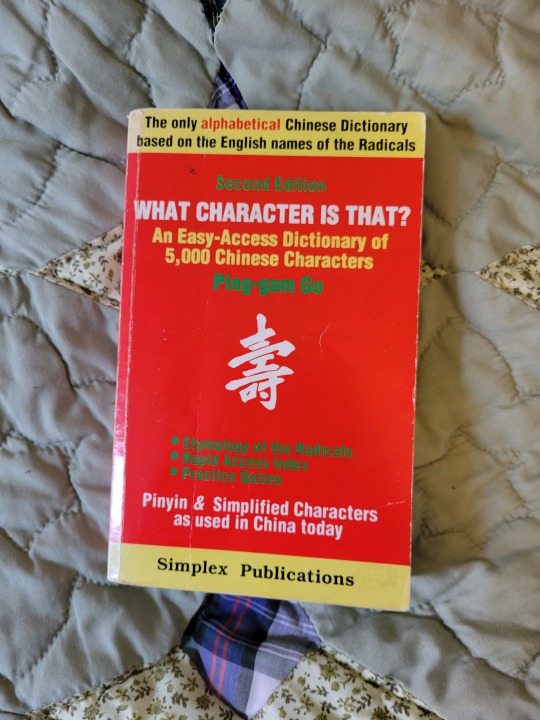
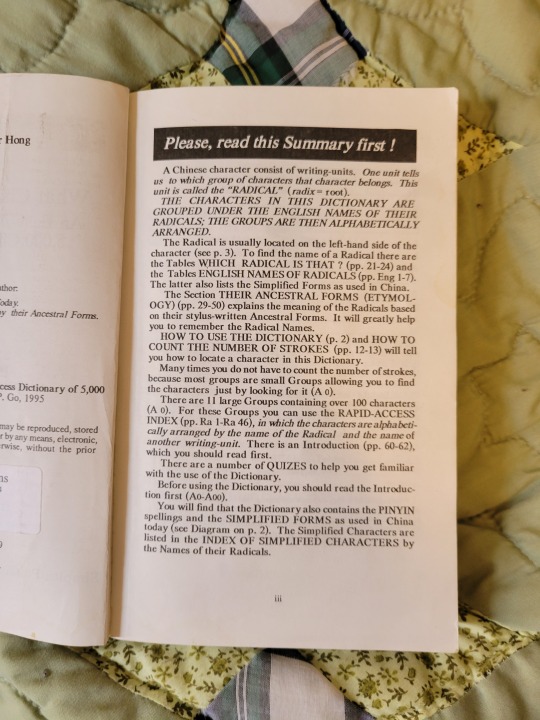
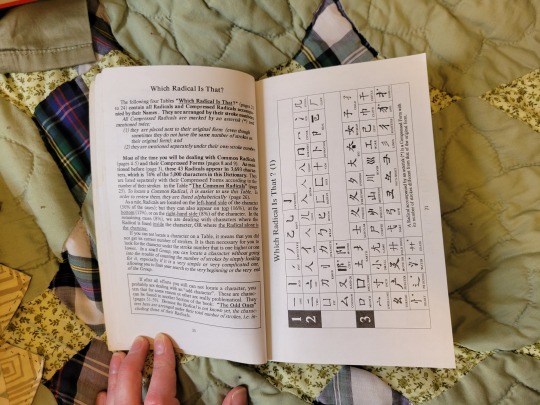
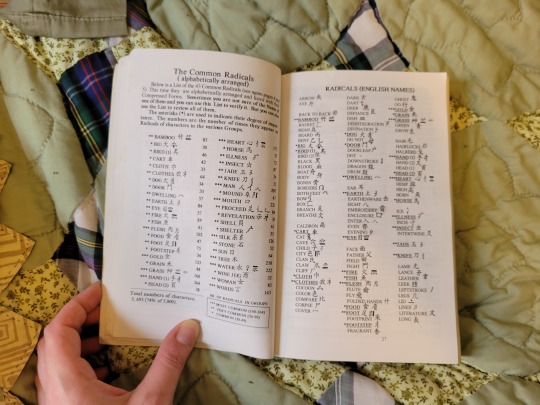
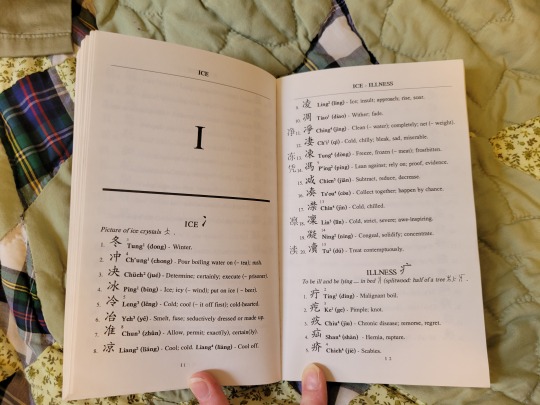
This strange little dictionary was gifted to me by a nun who went to high school with my grandma and later lived in China as a missionary. It's organized alphabetically based on the English translation of each radical?
I have not used this dictionary for actual reference ever, because I flipped through it once and realized that it was absolutely whack. But it's cool to have I guess.
2. 新华字典 第11版
monolingual
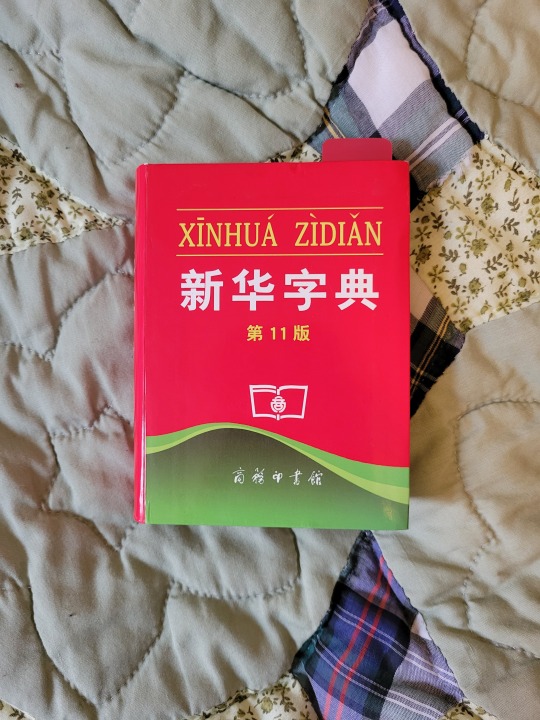
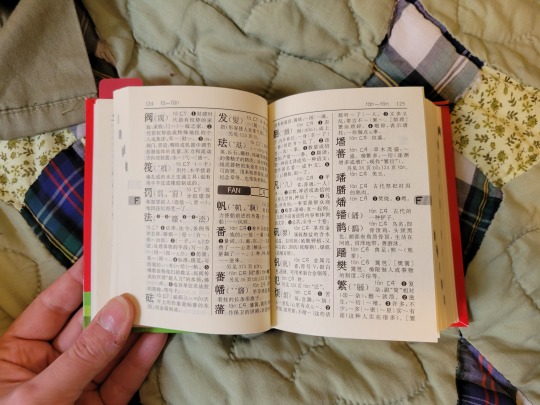
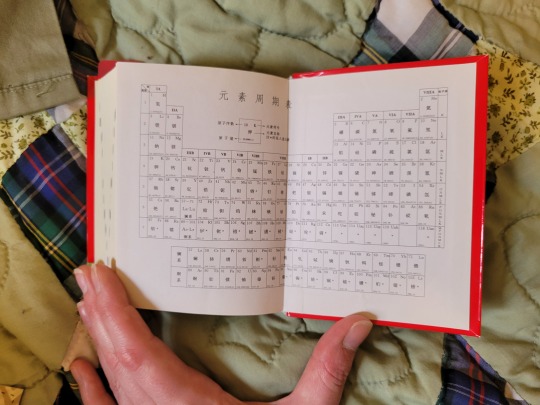
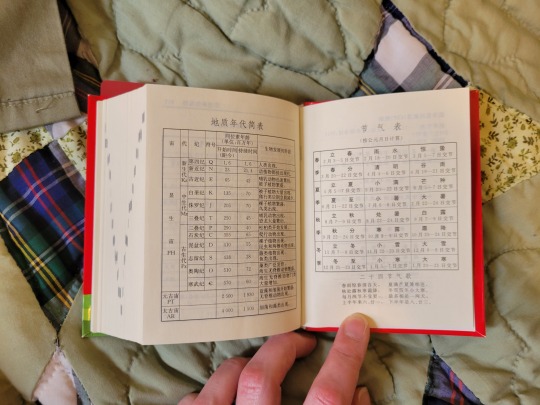
This little guy was gifted to me by a Chinese classmate back when I was in college. It's a 字典, so it's just focused on defining individual characters and providing some words featuring that character. Despite being a mainland dictionary, it also has 注音 next to each character for some reason.
It's got some neat stuff towards the back, like the periodic table and a chart of all the 節氣 solar terms.
3. 小学生全笔顺 同义词 近义词 反义词 组词 造句 成语 多音多义字 词典
monolingual
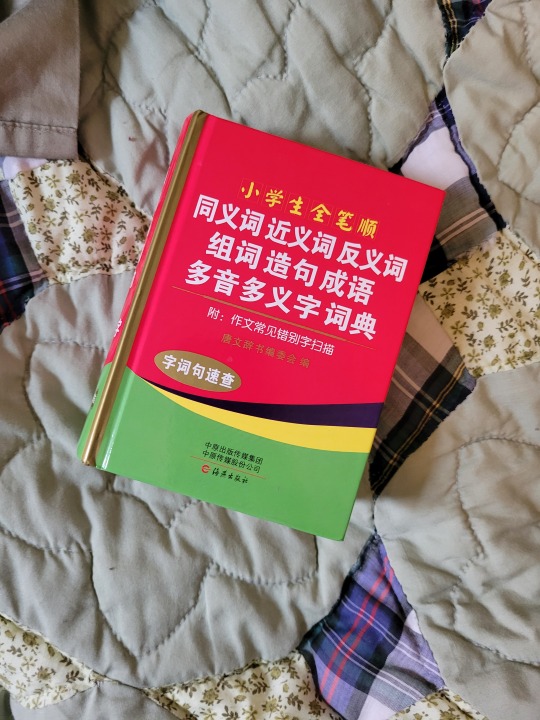
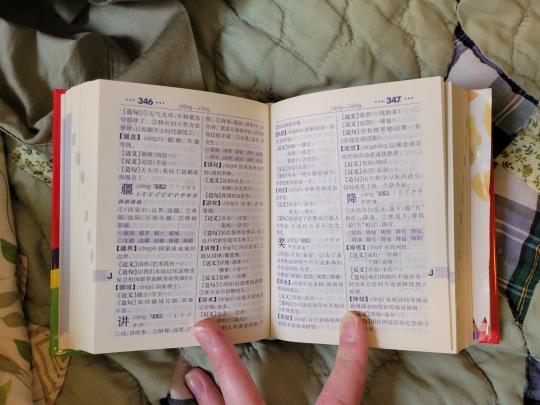
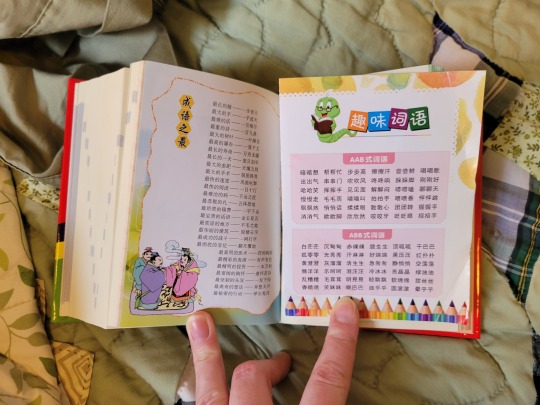
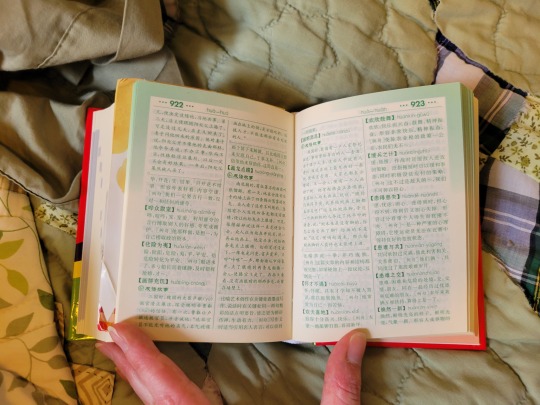
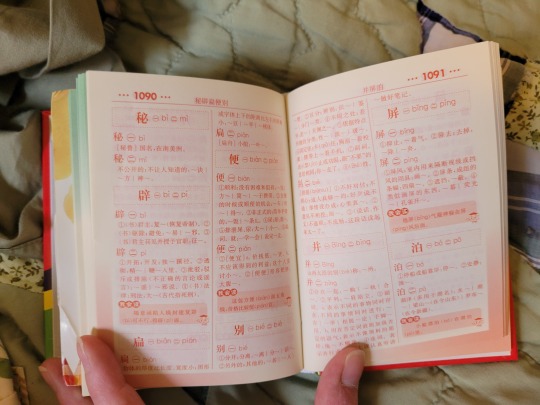
Whew, that's a mouthful. This is an actual 词典, so it defines full words. It also provides example sentences, synonyms, antonyms, and close equivalents. Then there's a section for idioms, and another section for 多音多义字.
There's also this nifty little insert with examples of words/phrases that follow common patterns of repetition.
4. 新现代汉语词典
monolingual
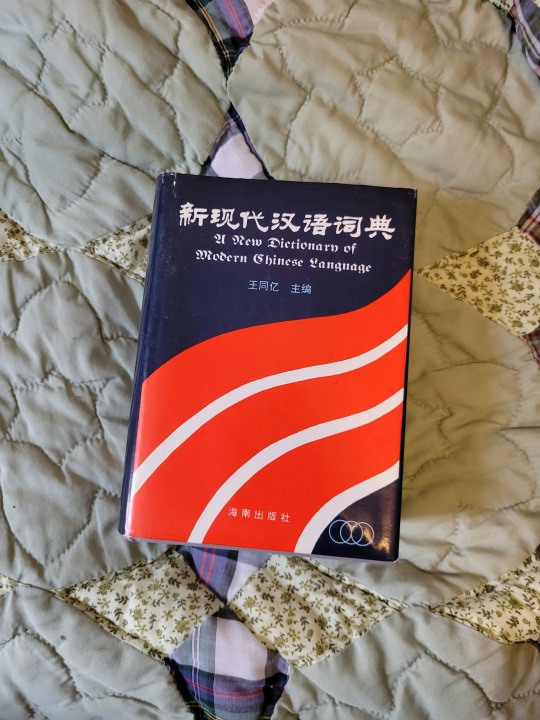
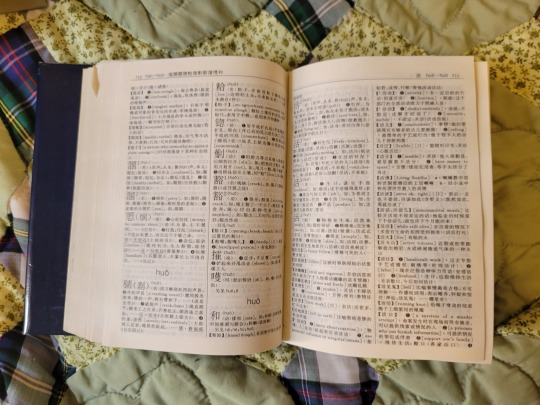
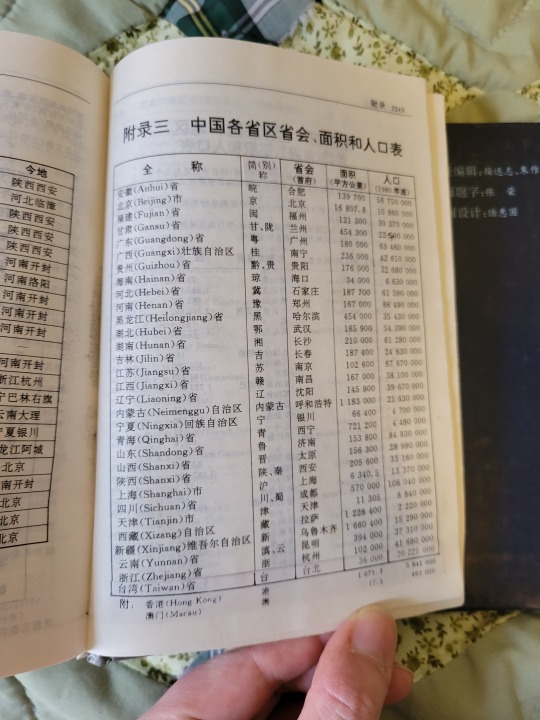
I picked up this chunky guy from a used bookstore down the street from me (the owner of the store passed last year, and the store is no longer there unfortunately). This is a fairly normal dictionary, it's just bigger than my others and has more words listed in it.
One thing I also noticed is that this chart towards the end of the dictionary apparently had a strip of paper pasted on the bottom. It doesn't seem like something I can peel up without damaging the paper under it, and when I shine a flashlight through the page I can't make out any major differences between what's on the sticker and what might be on the page under it. So my best guess is there might have been some damage to the text on the page?
5. 商务馆学汉语近义词词典 The Commercial Press Guide to Chinese Synonyms
monolingual
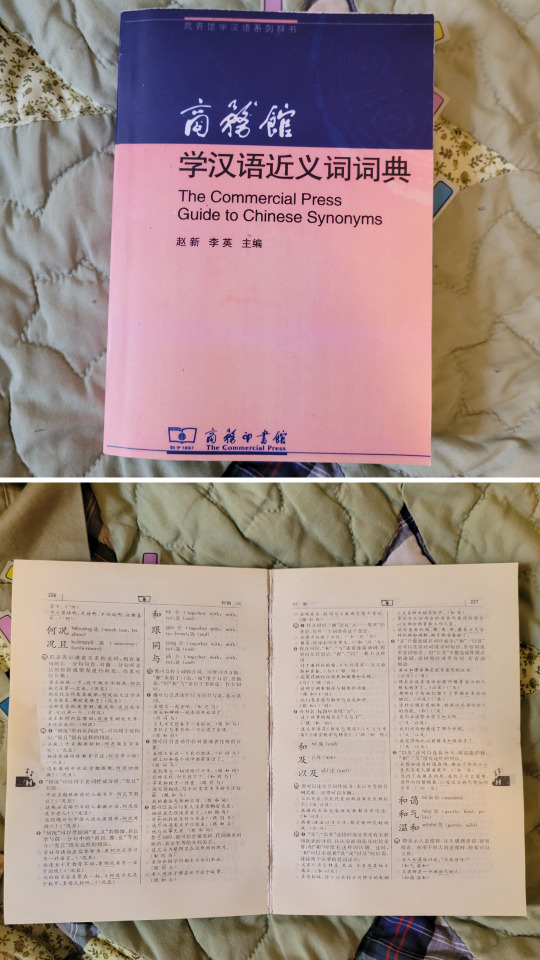
This book is easily the one I reference the most. As the name suggests, the book is all about synonyms. It takes sets of 2+ similar words and thoroughly explains the similarities and differences between them all. There's plenty example sentences, with notes about whether the synonyms can be used interchangeably in certain contexts.
It's a great resource, but I had a bit of trouble getting my hands on a copy. It's possible that in the years since I bought it there have been more copies made available for sale though.
these next two are books I haven't explored too much since they are old and the binding is incredibly fragile and starting to fall apart. just opening them is stressful.
6. 漢字分解 Chinese Characters Explained by F.X. Keelan (aka 康愛玲修女) (1967?)
bilingual
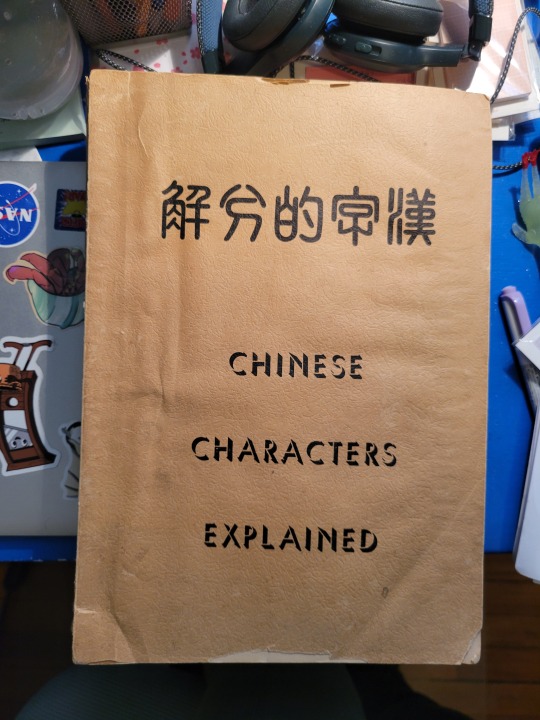

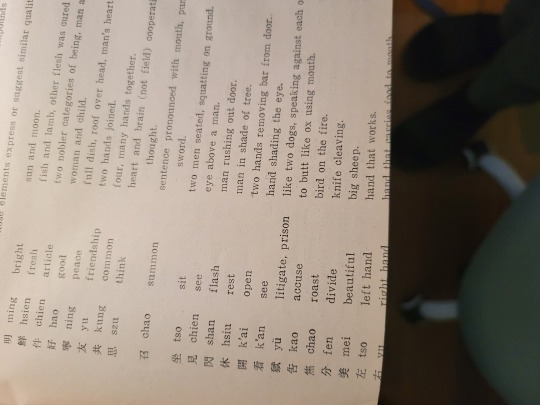
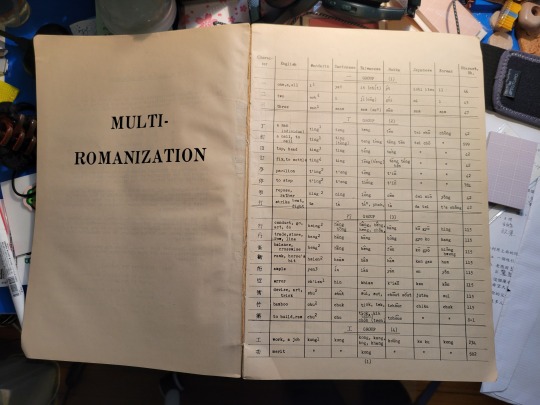
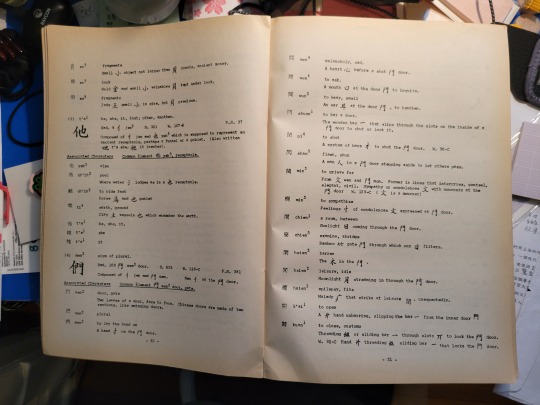
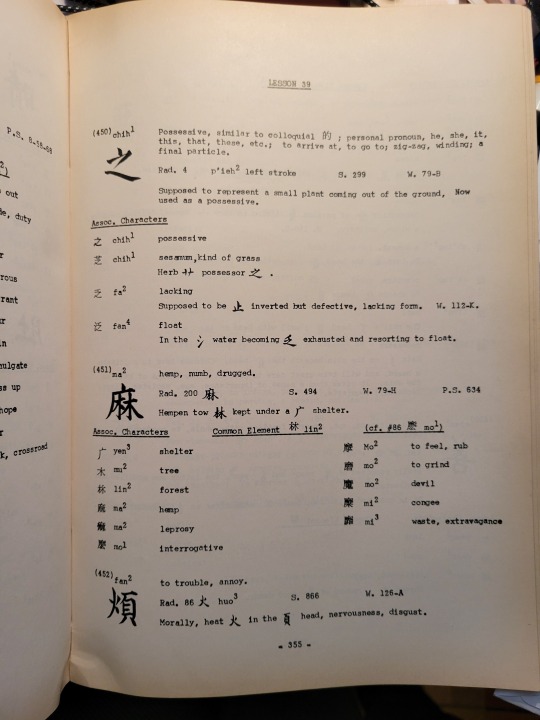
This book was also gifted to me by the nun who went to school with my grandma, and appears to also have been written by a nun! Based on what I've found from Google, this book was published in 1967.
Rather than a dictionary, this book is "a compilation intended as an aid in grouping and remembering [Chinese characters] with a view in acquiring a reading knowledge of Chinese"(p. iii). It aims to break down characters into radicals and giving similar/related characters. It's apparently the final installment in a 4 part Mandarin Course.
This book uses traditional characters. According to Google Books, the publisher is 光啓出版社, which is a Taiwanese organization. The book includes a very long table that has Mandarin, Cantonese, Taiwanese, Hakka, Japanese, and Korean pronunciations for (what seems to be) every character mentioned in the book. The intro mentions that this is so the course is more "accessible" for speakers of other East Asian languages.
Also, look at that printing error in the third photo! The text got cut off at the bottom of the page.
7. The Structure of Chinese Characters by John Chalmers (second edition, 1911)
bilingual
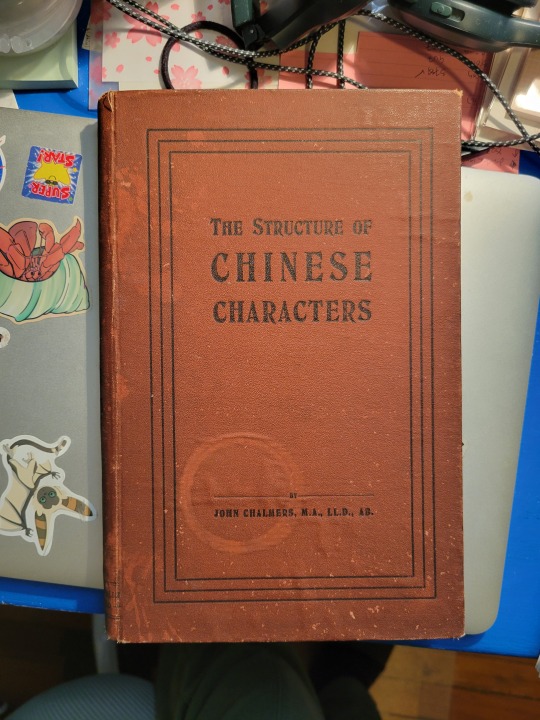
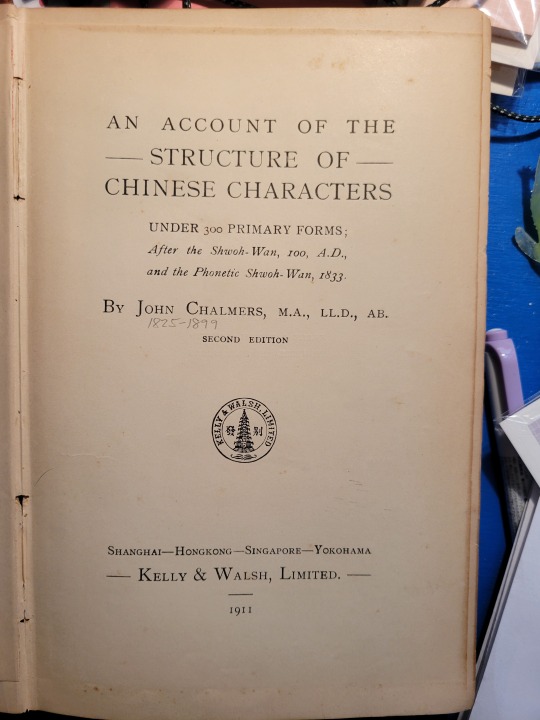
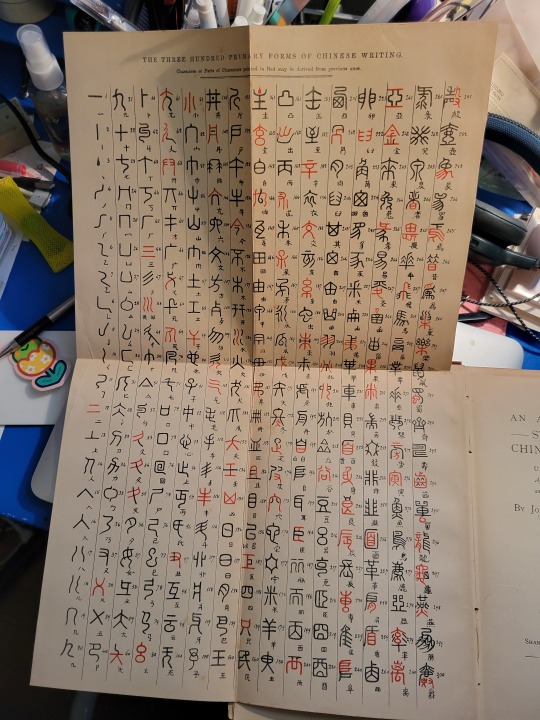
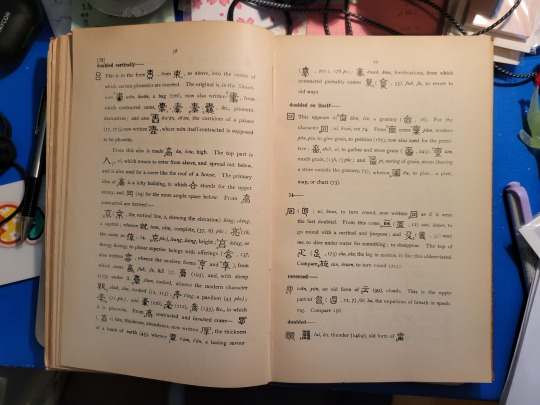
This final book is the oldest of the bunch, and was gifted to me by my boss's boss for some reason? She found it in a used bookstore apparently.
This book also uses traditional characters, because simplified characters just weren't a thing yet in 1911. This book is falling apart, and opening it stresses me out. It creaks whenever I open it.
Going by the title page, the full title of this book is An Account of the Structure of Chinese Characters Under 300 Primary Forms; After the Shwo-Wan, 100 A.D., and the Phonetic Shwoh-Wan, 1833. It was published by Kelly & Walsh, which was a Shanghai-based publisher.
Someone very kindly penciled in the years the author was alive: 1825-1899. John Chalmers was apparently a Scottish missionary (bc of course he was) who apparently popularized the term "Cantonese". This book that I own in particular was originally published in 1882.
It is, as the very long title suggests, an analysis and etymology of 300 common components
It also has a nifty fold-out of all 300 "primary forms" in seal script.
90 notes
·
View notes